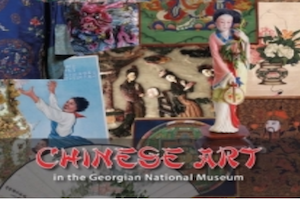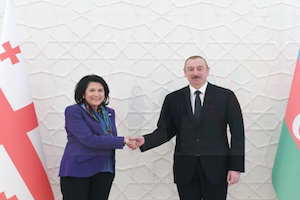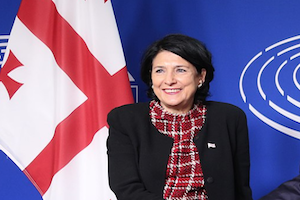China's Soft Power in the South Caucasus
By Nurlan Aliyev
March 2, 2020, the CACI Analyst
In December 26, 2019 , the Georgian National Museum presented a new exhibition titled “Chinese Art in the Georgian National Museum,” dedicated to the 70th anniversary of the People’s Republic of China, and a book on the theme by Georgian authors. Within this project, supported by the Embassy of the People’s Republic of China in Georgia, several exhibitions of works by Chinese painters take place in Tbilisi between December 2019 and February 2020. In recent years China’s growing economic presence in the South Caucasus has been accompanied by developments in cultural and educational relations between China and the regional states.

New Wave of Anti-Government Protests in Georgia
By Natalia Konarzewska
December 16, 2019, the CACI Analyst
Before the dust from the June anti-government demonstrations had time to settle, Georgia saw a new round of protests in November. This time, Georgians took the streets after the ruling Georgian Dream (GD) party declined to reform the electoral system despite earlier promises. A majority of Georgians support switching from a mixed to a fully proportional electoral system before the 2020 parliamentary elections, since this will break the ruling party’s electoral domination and ensure a fairer parliamentary representation for small parties. GD proposed electoral reform in June to meet opposition demands, however, in November the ruling party surprisingly backed away from the idea after failing to collect the essential number of votes among its deputies to pass the constitutional amendment.

Political Turbulence in Georgia One Year Before Elections
By Natalia Konarzewska
September 16, 2019, the CACI Analyst
One year ahead of the 2020 parliamentary elections, Georgia is experiencing a serious political crisis that has exposed deep flaws in the rule of Georgian Dream (GD) and its illusive reconciliation with Russia. The visit of a Russian lawmaker to Georgia’s Parliament in June sparked outrage across the country and fueled widespread disappointment with the ruling party’s policies. The parliamentary scandal delivered a serious blow to the government’s approval ratings and its hallmark policy of rapprochement with Russia. This is a worrying trend for the ruling party, which is seeking a third consecutive term but increasingly compromises democratic principles in order to stay in power.

Are Georgia-Azerbaijan Relations at Risk?
By Svante E. Cornell
July 30, 2019, the CACI Analyst
Azerbaijan and Georgia have enjoyed almost three decades of a strategic partnership that has shaped the geopolitical landscape of the whole greater Eurasia. Yet Azerbaijani-Georgian relations `have recently witnessed an unparalleled level of tensions. Ostensibly about a border demarcation issue, the slump in the relationship nevertheless derives in part from the effort of foreign powers to separate the two partners from each – willfully in the case of Russia, and inadvertently in the case of the West. It is time for both countries and their partners to pay attention to this crucial relationship.

Georgian Politics in Anticipation of the 2020 Parliamentary
By Casper Wuite
May 28, 2019, the CACI Analyst
Only six months after a closely fought presidential election, Georgia’s political forces are repositioning themselves for the 2020 parliamentary elections. With Georgian Dream’s popularity waning – the party won landslides in previous votes – the party may need support from conservative and ultra-nationalist political parties in order to form a majority government after 2020. The international community, concerned about the rise of pro-Russian and nationalist sentiment, will keenly watch the 2020 elections to see in which direction the country, and its process of democratization and Euro-Atlantic and European Integration, is heading.



